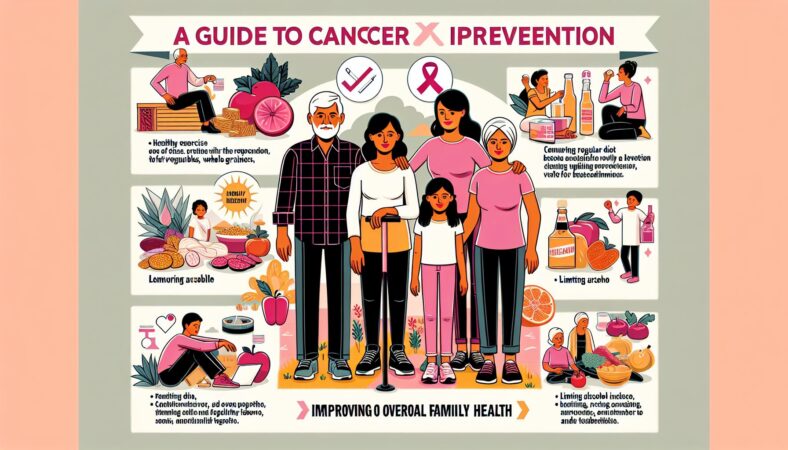Family health is of paramount importance to everyone. We all want to lead long and healthy lives, free from the burden of illnesses. One key aspect of family health is cancer prevention. By adopting a proactive approach towards family healthcare, we can significantly reduce the risks of cancer for ourselves and our loved ones. In this article, we will explore various strategies and lifestyle choices that can contribute to cancer prevention while paving the way for a healthier and happier family life.
Understanding the Importance of Family Healthcare
Family healthcare goes beyond just individual well-being. It encompasses the physical, emotional, and mental well-being of every family member. By prioritizing family healthcare, we can create a nurturing environment, promote healthy habits, and reduce the risk of diseases, including cancer. A comprehensive approach to family healthcare involves adopting a balanced lifestyle, regular check-ups, and implementing preventive measures.
Promoting a Balanced Lifestyle
A balanced lifestyle is the foundation of good health. To promote family health and reduce the risk of cancer, it is crucial to focus on various aspects of daily life. Here are some practical steps to consider:
1. Maintain a Nutritious Diet
A diet rich in fruits, vegetables, whole grains, and lean proteins provides essential nutrients and antioxidants that can help prevent cancer. Encourage your family to consume a variety of colorful fruits and vegetables, which contain a range of beneficial compounds. Limit the intake of processed foods, sugary snacks, and saturated fats to maintain a healthy weight and reduce the risk of cancer.
2. Encourage Physical Activity
Regular physical activity not only helps maintain a healthy weight but also decreases the risk of certain cancers. Encourage your family to engage in regular exercise, such as brisk walking, cycling, or dancing. Make physical activity fun by involving the whole family in outdoor games, sports, or recreational activities. Remember, even small changes like taking the stairs instead of the elevator can make a significant difference.
3. Minimize Exposure to Harmful Substances
Limiting exposure to harmful substances is essential to reduce the risk of cancer. Avoid or minimize the use of tobacco in any form, including smoking or chewing tobacco. Secondhand smoke is equally dangerous, so strive for a smoke-free environment at home. Additionally, limit alcohol consumption, as excessive drinking has been linked to several types of cancer.
4. Prioritize Mental and Emotional Well-being
Family health is not solely reliant on physical factors; mental and emotional well-being are equally significant. High levels of stress and anxiety can weaken the immune system and increase the risk of cancer. Focus on nurturing healthy relationships, open communication, and stress-management techniques. Practice mindfulness, engage in hobbies, and create opportunities for quality family time together.
Regular Check-ups and Early Detection
While preventive measures are crucial, regular check-ups and early detection play a significant role in family healthcare and cancer prevention. Regular visits to healthcare professionals enable the detection of potential health issues before they become severe. Here’s why regular check-ups matter:
1. Screenings and Vaccinations
Certain cancers can be detected early through screenings, such as mammograms, Pap smears, colonoscopies, and skin checks. Consult with your healthcare provider to determine which screenings are appropriate for your family members based on age, gender, and family medical history. Vaccinations against viruses such as HPV and hepatitis B, which can lead to specific cancers, are also essential preventive measures.
2. Knowledge is Power
Regular check-ups provide an opportunity to discuss any concerns, ask questions, and stay informed about potential risk factors and preventive measures. Healthcare professionals can guide you about healthy lifestyle choices and provide personalized recommendations tailored to your family’s unique needs.
3. Early Detection Saves Lives
Early detection of cancer significantly improves treatment outcomes. Regular check-ups enable healthcare providers to identify any warning signs, conduct necessary tests, and initiate prompt treatment if needed. Early intervention increases the chances of successful cancer management and recovery.
Implementing Preventive Measures
In addition to a balanced lifestyle and regular check-ups, certain preventive measures can help reduce the risk of cancer within your family. While these measures do not guarantee complete cancer prevention, they significantly contribute to overall family health. Here are a few vital preventive measures:
1. Educate Your Family
Knowledge is a powerful tool in cancer prevention. Educate yourself and your family members about the different types of cancer, their risk factors, and symptoms. By spreading awareness and understanding, you empower your family to take control of their health and seek medical attention when necessary.
2. Practice Sun Safety
Ultraviolet (UV) rays from the sun can contribute to skin cancer. Protect your family’s skin by practicing sun safety measures such as using sunscreen with a high SPF, wearing protective clothing, and avoiding excessive sun exposure, especially during peak hours.
3. Be Mindful of Environmental Factors
Certain chemicals and environmental factors can increase the risk of cancer. Be mindful of potential carcinogens in your surroundings, such as asbestos and radon. Ensure your home is well-ventilated and free from dangerous substances. Consider using natural and eco-friendly cleaning products to reduce unnecessary chemical exposure.
4. Lead by Example
As a caregiver and role model, leading by example is crucial in promoting family health. Embrace a healthy lifestyle, avoid risky behaviors, and prioritize your own regular check-ups. Encourage open conversations about health within the family and create an environment where everyone feels comfortable sharing their concerns.
Conclusion
Family healthcare and cancer prevention go hand in hand when it comes to leading a fulfilling and healthy life. By implementing a balanced lifestyle, prioritizing regular check-ups, and embracing preventive measures, you can significantly reduce the risk of cancer for your family. Remember, family health is a collective effort, so involve every family member and lead by example. Together, let’s prioritize family healthcare and create a healthier future for our loved ones.
